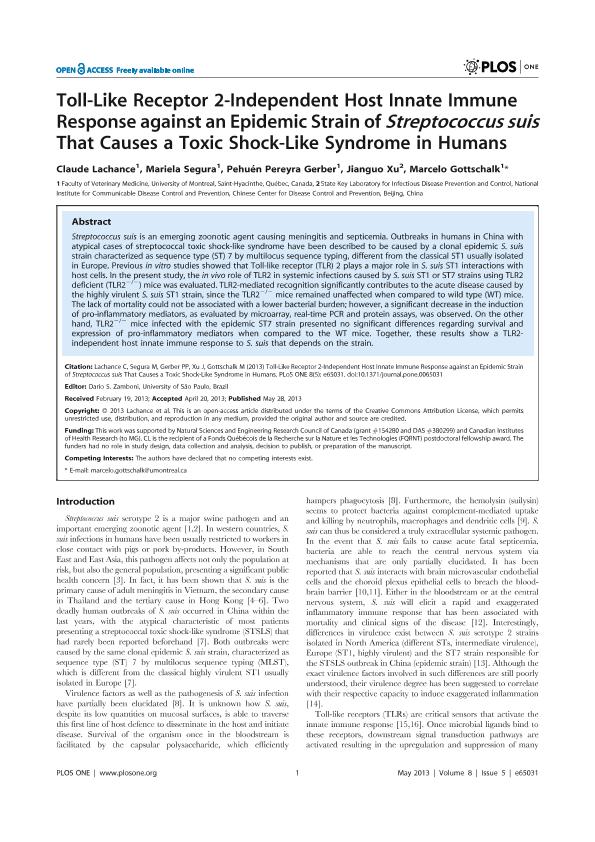Mostrar el registro sencillo del ítem
dc.contributor.author
Lachance, Claude
dc.contributor.author
Segura, Mariela
dc.contributor.author
Pereyra Gerber, Federico Pehuén

dc.contributor.author
Xu, Jianguo
dc.contributor.author
Gottschalk, Marcelo
dc.date.available
2015-10-14T19:28:11Z
dc.date.issued
2013-05
dc.identifier.citation
Lachance, Claude; Segura, Mariela; Pereyra Gerber, Federico Pehuén; Xu, Jianguo; Gottschalk, Marcelo; Toll-Like Receptor 2-Independent Host Innate Immune Response against an Epidemic Strain of Streptococcus suis That Causes a Toxic Shock-Like Syndrome in Humans; Public Library of Science; Plos One; 8; 5; 5-2013; e65031-e65031
dc.identifier.issn
1932-6203
dc.identifier.uri
http://hdl.handle.net/11336/2537
dc.description.abstract
Streptococcus suis is an emerging zoonotic agent causing meningitis and septicemia. Outbreaks in humans in China with atypical cases of streptococcal toxic shock-like syndrome have been described to be caused by a clonal epidemic S. suis strain characterized as sequence type (ST) 7 by multilocus sequence typing, different from the classical ST1 usually isolated in Europe. Previous in vitro studies showed that Toll-like receptor (TLR) 2 plays a major role in S. suis ST1 interactions with host cells. In the present study, the in vivo role of TLR2 in systemic infections caused by S. suis ST1 or ST7 strains using TLR2 deficient (TLR2−/−) mice was evaluated. TLR2-mediated recognition significantly contributes to the acute disease caused by the highly virulent S. suis ST1 strain, since the TLR2−/− mice remained unaffected when compared to wild type (WT) mice. The lack of mortality could not be associated with a lower bacterial burden; however, a significant decrease in the induction of pro-inflammatory mediators, as evaluated by microarray, real-time PCR and protein assays, was observed. On the other hand, TLR2−/− mice infected with the epidemic ST7 strain presented no significant differences regarding survival and expression of pro-inflammatory mediators when compared to the WT mice. Together, these results show a TLR2-independent host innate immune response to S. suis that depends on the strain.
dc.format
application/pdf
dc.language.iso
eng
dc.publisher
Public Library of Science

dc.rights
info:eu-repo/semantics/openAccess
dc.rights.uri
https://creativecommons.org/licenses/by/2.5/ar/
dc.subject
Streptococcus Suis
dc.subject
Toll-Like Receptor 2
dc.subject
Toxic-Shock Syndrome
dc.subject
Host Response to Pathogen
dc.subject.classification
Inmunología

dc.subject.classification
Medicina Básica

dc.subject.classification
CIENCIAS MÉDICAS Y DE LA SALUD

dc.title
Toll-Like Receptor 2-Independent Host Innate Immune Response against an Epidemic Strain of Streptococcus suis That Causes a Toxic Shock-Like Syndrome in Humans
dc.type
info:eu-repo/semantics/article
dc.type
info:ar-repo/semantics/artículo
dc.type
info:eu-repo/semantics/publishedVersion
dc.date.updated
2016-03-30 10:35:44.97925-03
dc.journal.volume
8
dc.journal.number
5
dc.journal.pagination
e65031-e65031
dc.journal.pais
Estados Unidos

dc.journal.ciudad
San Francisco
dc.description.fil
Fil: Lachance, Claude. University of Montreal; Canadá
dc.description.fil
Fil: Segura, Mariela. University of Montreal; Canadá
dc.description.fil
Fil: Pereyra Gerber, Federico Pehuén. Universidad de Buenos Aires. Facultad de Medicina. Departamento de Microbiología; Argentina. Consejo Nacional de Investigaciones Científicas y Técnicas. Oficina de Coordinación Administrativa Houssay; Argentina
dc.description.fil
Fil: Xu, Jianguo. Chinese Center for Disease Control and Prevention; China
dc.description.fil
Fil: Gottschalk, Marcelo. University of Montreal; Canadá
dc.journal.title
Plos One

dc.relation.alternativeid
info:eu-repo/semantics/altIdentifier/url/http://www.ncbi.nlm.nih.gov/pmc/articles/PMC3665724/
dc.relation.alternativeid
info:eu-repo/semantics/altIdentifier/doi/http://dx.doi.org/10.1371%2Fjournal.pone.0065031
dc.relation.alternativeid
info:eu-repo/semantics/altIdentifier/url/http://journals.plos.org/plosone/article?id=10.1371/journal.pone.0065031
Archivos asociados
